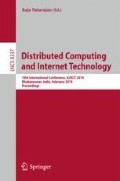Abstract
In today’s digital ecosystem, where people share vital information on a daily basis, it is imperative to identify security loopholes and vulnerability in social networks. Through identity resolution and disambiguation, information leakage and identity hijacking by malicious parties, can be reduced significantly. In this paper, we develop a simple model for successfully classifying Twitter users as suspicious and non-suspicious in their user activity. Our aim is to be able to find a concrete set of users that encompasses most users who misrepresent their identity on Twitter. Using user and tweet meta-data, we devised a mathematical model to tag users as listener, talker, hub, seed and absorber, and further conjugate the values generated by these equations, to identify suspicious and non-suspicious users in our 49,991-user dataset. This model of classification can be extended for integration with rigorous security mechanisms to identify true malicious users on Twitter and other online social platforms.
Access this chapter
Tax calculation will be finalised at checkout
Purchases are for personal use only
Preview
Unable to display preview. Download preview PDF.
References
Benevenuto, F., Magno, G., Rodrigues, T., Almeida, V.: Detecting spammers on twitter. In: Collaboration, Electronic Messaging, Anti-Abuse and Spam Conference (CEAS), vol. 6 (2010)
Bilge, L., Strufe, T., Balzarotti, D., Kirda, E.: All your contacts are belong to us: automated identity theft attacks on social networks. In: Proceedings of the 18th International Conference on World Wide Web, pp. 551–560. ACM (2009)
Cao, Q., Sirivianos, M., Yang, X., Pregueiro, T.: Aiding the detection of fake accounts in large scale social online services. Technical report (2011), http://www.cs.duke.edu/~qiangcao/publications/sybilrank_tr.pdf
Chu, Z., Gianvecchio, S., Wang, H., Jajodia, S.: Who is tweeting on twitter: human, bot, or cyborg? In: Proceedings of the 26th Annual Computer Security Applications Conference, pp. 21–30. ACM (2010)
Gostev, A., Zaitsev, O., Golovanov, S., Kamluk, V.: Kaspersky security bulletin malware evolution 2008. Kaspersky Lab (April 2009)
Hauff, C., Houben, G.-J.: Deriving knowledge profiles from twitter. In: Kloos, C.D., Gillet, D., Crespo García, R.M., Wild, F., Wolpers, M. (eds.) EC-TEL 2011. LNCS, vol. 6964, pp. 139–152. Springer, Heidelberg (2011)
Iskold, A.: 5 ways to have fun with twitter when you’re bored (March 2008), http://readwrite.com (cited: May 11, 2013)
Kouloumpis, E., Wilson, T., Moore, J.: Twitter sentiment analysis: The good the bad and the omg. In: Proceedings of the Fifth International AAAI Conference on Weblogs and Social Media (2011)
Lee, S., Kim, J.: Warningbird: Detecting suspicious urls in twitter stream. In: Symposium on Network and Distributed System Security, NDSS (2012)
Makridakis, A., Athanasopoulos, E., Antonatos, S., Antoniades, D., Ioannidis, S., Markatos, E.P.: Understanding the behavior of malicious applications in social networks. IEEE Network 24(5), 14–19 (2010)
Mislove, A., Viswanath, B., Gummadi, K.P., Druschel, P.: You are who you know: inferring user profiles in online social networks. In: Proceedings of the Third ACM International Conference on Web Search and Data Mining, pp. 251–260. ACM (2010)
Patsakis, C., Asthenidis, A., Chatzidimitriou, A.: Social networks as an attack platform: Facebook case study. In: Eighth International Conference on Networks, ICN 2009, pp. 245–247. IEEE (2009)
Sankaranarayanan, J., Samet, H., Teitler, B.E., Lieberman, M.D., Sperling, J.: Twitterstand: news in tweets. In: Proceedings of the 17th ACM SIGSPATIAL International Conference on Advances in Geographic Information Systems, pp. 42–51. ACM (2009)
Thomas, K., Grier, C., Paxson, V., Song, D.: Suspended accounts in retrospect: An analysis of twitter spam. In: Proc. of IMC (2011)
Tumasjan, A., Sprenger, T.O., Sandner, P.G., Welpe, I.M.: Predicting elections with twitter: What 140 characters reveal about political sentiment. In: Proceedings of the Fourth International AAAI Conference on Weblogs and Social Media, pp. 178–185. AAAI Press (2010)
Agarwal, A., Xie, B., Vovsha, I., Rambow, O., Passonneau, R.: Sentiment analysis of twitter data. In: ACL HLT 2011, p. 30 (2011)
Wang, A.H.: Don’t follow me: Spam detection in twitter. In: Proceedings of the 2010 International Conference on Security and Cryptography (SECRYPT), pp. 1–10. IEEE (2010)
Yang, Z., Wilson, C., Wang, X., Gao, T., Zhao, B.Y., Dai, Y.: Uncovering social network sybils in the wild. In: Proceedings of the 2011 ACM SIGCOMM Conference on Internet Measurement Conference, pp. 259–268. ACM (2011)
Yardi, S., Boyd, D.: Tweeting from the town square: Measuring geographic local networks. In: Proceedings of the International Conference on Weblogs and Social Media, pp. 194–201 (2010)
Author information
Authors and Affiliations
Editor information
Editors and Affiliations
Rights and permissions
Copyright information
© 2014 Springer International Publishing Switzerland
About this paper
Cite this paper
Sharma, A.D., Ahluwalia, A., Deep, S., Bansal, D. (2014). Friend or Foe: Twitter Users under Magnification. In: Natarajan, R. (eds) Distributed Computing and Internet Technology. ICDCIT 2014. Lecture Notes in Computer Science, vol 8337. Springer, Cham. https://doi.org/10.1007/978-3-319-04483-5_26
Download citation
DOI: https://doi.org/10.1007/978-3-319-04483-5_26
Publisher Name: Springer, Cham
Print ISBN: 978-3-319-04482-8
Online ISBN: 978-3-319-04483-5
eBook Packages: Computer ScienceComputer Science (R0)

